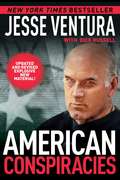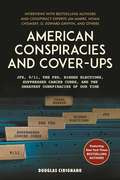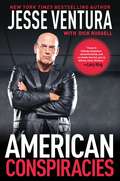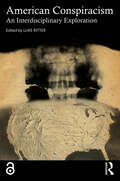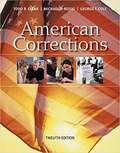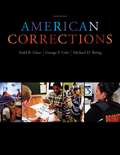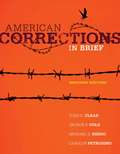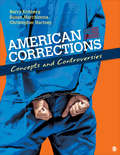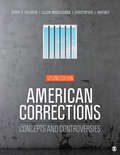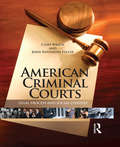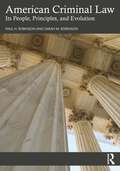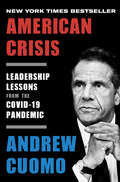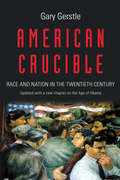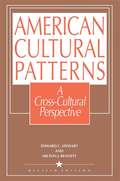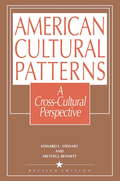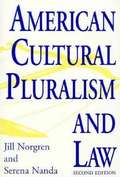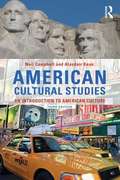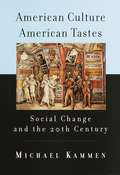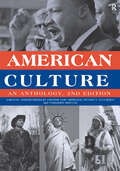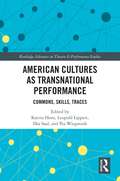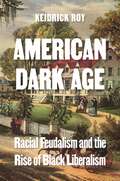- Table View
- List View
American Conspiracies
by Jesse Ventura Dick RussellNew York Times bestselling author Jesse Ventura is back with more conspiracies that our government wishes you didn’t know about! In this explosive account of wrongful acts and ensuing cover-ups, Jesse Ventura offers a different side to the stories we’ve all heard and read about in the history books. He takes a look at the wide gap between what the government knows and what is revealed to the American people. The media is complicit in these acts of deception, often refusing to consider alternate possibilities and dismissing voices that diverge from public opinion. He will look closely at the theories that have been presented over the years and examine the truth as well as the lies. Ventura does not shy away from the tough questions. As he states, "When I get denied something, I do the opposite of getting intimidated--I get angry. ” Now with new conspiracies added including information on the CIA torture scandal and the financial meltdown of 2008, you will see how the United States government continues to abuse our civil liberties and why we need to continue to stand up for what we know is right. You may not believe everything in American Conspiracies, but it is guaranteed to make you think harder about everything you do believe. Skyhorse Publishing, as well as our Arcade imprint, are proud to publish a broad range of books for readers interested in history--books about World War II, the Third Reich, Hitler and his henchmen, the JFK assassination, conspiracies, the American Civil War, the American Revolution, gladiators, Vikings, ancient Rome, medieval times, the old West, and much more. While not every title we publish becomes a New York Times bestseller or a national bestseller, we are committed to books on subjects that are sometimes overlooked and to authors whose work might not otherwise find a home.
American Conspiracies and Cover-ups: JFK, 9/11, the Fed, Rigged Elections, Suppressed Cancer Cures, and the Greatest Conspiracies of Our Time
by Douglas CirignanoInterviews with Jim Marrs, Noam Chomsky, G. Edward Griffin, and Other Experts “Those intrepid souls seeking to peer deeper into America’s greatest conspiracies should start with Douglas Cirignano’s voluminous book. Pick your favorite conspiracy—Cirignano has them all, with incisive interviews with knowledgeable experts. Don’t miss this tour de force of conspiracy facts." —Jim Marrs, journalist and New York Times bestselling author of Rule by Secrecy; The Rise of the Fourth Reich; The Trillion-Dollar Conspiracy; and Population Control: How Corporate Owners Are Killing Us. American Conspiracies and Cover-ups brings together interviews with the bestselling and brightest minds in the alternative history world to create the definitive guide to our country’s biggest secrets. Interviews include:Jim Marrs on the New World OrderNoam Chomsky on mainstream mediaThe JFK assassination with LBJ’s lawyerVeteran and author Robert B. Stinnet on Pearl HarborG. Edward Griffin on the Federal Reserve BankDr. William F. Pepper on MLK's assassinationProfessor David Ray Griffin on 9/11and more!Author Douglas Cirignano brings together the foremost experts in the field to answer these questions once and for all, and proves that mainstream histories don’t tell the real story.
American Conspiracies: Lies, Lies, and More Dirty Lies That the Government Tells Us
by Jesse Ventura Dick RussellIn this explosive account of wrongful acts and on-going cover-ups, Jesse Ventura takes a systematic look at the wide gap between what the American government knows and what it reveals to the American people. For too long, we the people have sat by and let politicians and bureaucrats from both parties obfuscate and lie. And according to this former Navy SEAL, former pro wrestler, and former Minnesota governor, the media is complicit in these acts of deception. For too long, the mainstream press has refused to consider alternate possibilities and to ask the tough questions. Here, Ventura looks closely at the theories that have been presented over the years and separates the fact from the fiction. In Ventura's eyes, the murder of Abraham Lincoln and the assassinations of the Kennedys and Martin Luther King, all need to be re-examined. Was Watergate presented honestly, or was the CIA involved? Did the Republican Party set out to purposefully steal two elections on behalf of George W. Bush? Has all the evidence been presented about the 9/11 attacks or is there another angle that the media is afraid to explore? And finally, is the collapse of today's financial order and the bailout plan by the Federal Reserve the widest-reaching conspiracy ever perpetrated? "If you're talking outspoken, unconventional, and no-holds-barred, you're talking Jesse Ventura," Larry King. "I wouldn't mind seeing Ventura run for president (or for senator, or dog-catcher, or whatever). In addition to talking conspiracy, he's likely to raise all sorts of other trouble. " Damon W. Root, Reason Magazine
American Conspiracism: An Interdisciplinary Exploration
by Luke RitterThis important collection explores the social effects of popular American conspiratorial beliefs, featuring the work of 22 scholars representing multiple academic disciplines.This book aims to better understand the phenomenon of American conspiracism by investigating how people acquire their beliefs, how conspiratorial stories function in politics and society, the role of conspiracy theories in the formation of national identities, and what conspiratorial beliefs mean to individual believers. Topics include QAnon, the Boogaloo Boys, the satanic panic, the Martin Luther King, Jr. Assassination, the Great Replacement Theory, anti-Catholic nativism, Flat Earth belief, Elvis Lives, COVID-19 denial, and much more. Each essay is accessibly and engagingly written without compromising quality.American Conspiracism is essential reading for students of psychology, political science, and U.S. history, as well as journalists, independent researchers, and anyone interested in American conspiracies.
American Corrections (Mindtap Course List)
by George F. Cole Todd R. Clear Michael D. ReisigExplore the American corrections system from the perspective of both the corrections worker and the accused person in AMERICAN CORRECTIONS, 12th Edition. You'll learn about institutional and community sanctions, aided by high-profile corrections cases taken from recent headlines to reinforce important theories. The authors "tell it like it is" with thought-provoking, unbiased examinations of such topics as assisting felons during the re-entry process, reducing recidivism, the death penalty and surveillance. You'll also get a frontline view of careers in the corrections field.
American Corrections (Tenth Edition)
by George F. Cole Todd R. Clear Michael D. ReisigExplore the American corrections system from the perspective of both the corrections worker and the offender in AMERICAN CORRECTIONS, Tenth Edition. Comprehensive yet not overwhelming, the book covers both institutional and community sanctions, incorporating high-profile corrections cases taken from recent headlines to reinforce important theories. The authors "tell it like it is," offering you thought-provoking, unbiased examinations of such topics as assisting felons during the re-entry process, reducing recidivism, the death penalty, and surveillance. You'll also get a frontline view of careers in the corrections field.
American Corrections In Brief (Second Edition)
by George F. Cole Todd R. Clear Michael D. Reisig Carolyn PetrosinoA condensed, more accessible version of the best-selling corrections book on the market, AMERICAN CORRECTIONS IN BRIEF, 2nd Edition, introduces readers to the dynamics of corrections. Complete with valuable career-based material, insightful guest speakers, illuminating real-world cases, and uniquely even-handed treatment of institutional and community sanctions, the book examines the U.S. correctional system from the perspectives of both the corrections worker and the offender, providing readers with a well-rounded, balanced introduction to corrections.
American Corrections: Concepts and Controversies
by Barry A. Krisberg Susan Marchionna Christopher HartneyAmerican Corrections: Concepts and Controversies, by Barry Krisberg, Susan Marchionna, and Chris Hartney, presents an incisive view of every aspect of corrections (including jails, probation, sentencing, prisons, and parole), prompting students to think critically about the complex issues involved in responding to the current crisis in the U.S. correctional system. Incorporating theory, research, and the most recent available data, the book takes a contemporary and issues-oriented approach as it explores the most interesting and progressive developments in correctional policy and practice. Students will come away with practical knowledge, as well as a framework for thoughtful analysis of a subject that can seem mysterious or impenetrable. In addition, the book covers subjects many corrections texts treat only minimally, including women in corrections, the death penalty, and special populations. Perhaps most importantly, the book offers a point of view on what is plaguing the American correctional system and a realistic look at the solutions that offer real promise.
American Corrections: Concepts and Controversies
by Barry A. Krisberg Susan Marchionna Christopher HartneyAmerican Corrections: Concepts and Controversies, by Barry Krisberg, Susan Marchionna, and Chris Hartney, presents an incisive view of every aspect of corrections (including jails, probation, sentencing, prisons, and parole), prompting students to think critically about the complex issues involved in responding to the current crisis in the U.S. correctional system. Incorporating theory, research, and the most recent available data, the book takes a contemporary and issues-oriented approach as it explores the most interesting and progressive developments in correctional policy and practice. Students will come away with practical knowledge, as well as a framework for thoughtful analysis of a subject that can seem mysterious or impenetrable. In addition, the book covers subjects many corrections texts treat only minimally, including women in corrections, the death penalty, and special populations. Perhaps most importantly, the book offers a point of view on what is plaguing the American correctional system and a realistic look at the solutions that offer real promise.
American Corrections: Concepts and Controversies
by Barry A. Krisberg Susan Marchionna Christopher Hartney"It is a thorough and focused work on American corrections providing a solid opportunity for students to learn not only how the correctional system works but also to understand its ever increasing complexities." —Dorie Astle, Southwestern Oklahoma State University American Corrections, Second Edition offers students a contemporary, issues-oriented introduction that covers every aspect of corrections, prompting students to think critically about complex issues that are affecting the current U.S. correctional system. Incorporating the most recent theory, research, and data available, the Second Edition encourages students to explore the most interesting and progressive developments in correctional policy and practice. Authors Barry A. Krisberg, Susan Marchionna, and Christopher J. Hartney draw from years of professional experience to give students a practical knowledge of corrections, as well as provide a framework for thoughtful analysis into what is plaguing the American correctional system and a realistic exploration of the solutions that could make a difference. SAGE Premium Video Included in the interactive eBook! Corrections News Clips bring extra coverage of current events into the book, connecting brief 2 to 4 minute news clips to core chapter content. Interactive eBook Includes access to SAGE Premium Video and other multimedia tools. SAGE coursepacks FREE! Easily import our quality instructor and student resource content into your school’s learning management system (LMS) and save time. SAGE edge FREE online resources for students that make learning easier.
American Corrections: Concepts and Controversies
by Barry A. Krisberg Susan Marchionna Christopher Hartney"It is a thorough and focused work on American corrections providing a solid opportunity for students to learn not only how the correctional system works but also to understand its ever increasing complexities." —Dorie Astle, Southwestern Oklahoma State University American Corrections, Second Edition offers students a contemporary, issues-oriented introduction that covers every aspect of corrections, prompting students to think critically about complex issues that are affecting the current U.S. correctional system. Incorporating the most recent theory, research, and data available, the Second Edition encourages students to explore the most interesting and progressive developments in correctional policy and practice. Authors Barry A. Krisberg, Susan Marchionna, and Christopher J. Hartney draw from years of professional experience to give students a practical knowledge of corrections, as well as provide a framework for thoughtful analysis into what is plaguing the American correctional system and a realistic exploration of the solutions that could make a difference. SAGE Premium Video Included in the interactive eBook! Corrections News Clips bring extra coverage of current events into the book, connecting brief 2 to 4 minute news clips to core chapter content. Interactive eBook Includes access to SAGE Premium Video and other multimedia tools. SAGE coursepacks FREE! Easily import our quality instructor and student resource content into your school’s learning management system (LMS) and save time. SAGE edge FREE online resources for students that make learning easier.
American Courage
by Herbert W. Warden IIIDrawn from firsthand and historical writings, this book gives voice to the pilgrims, founding fathers, revolutionaries, pioneers, '49ers, cowboys, soldiers, pilots, and the many other heroes who have built the nation.
American Criminal Courts: Legal Process and Social Context
by John Randolph Fuller Casey WelchAmerican Criminal Courts: Legal Process and Social Context is an introductory-level text that offers a comprehensive study of the legal processes that guide criminal courts and the social contexts that introduce variations in the activities of actors inside and outside the court. Specifically the text focuses upon: Legal Processes. U.S. criminal courts are constrained by several legal processes and organizational structures that determine how the courts operate and how laws are applied. This book explores how democratic processes develop the criminal law in the United States, the documents that define law (federal and state constitutions, legal codes, administrative policies), the organizational structure of courts at the federal and state levels, the overlapping authority of the appeals process, and the effect of legal processes such as precedent, jurisdiction, and the underlying legal philosophies of various types of courts. Although most texts on criminal courts do a credible job of describing legal processes, this text looks more deeply into the origins of criminal law, historic turning points in the criminal law, conditions that affect the decision-making of criminal justice practitioners, and the contentious political process that affects how criminal laws are considered. Social Contexts. The criminal courts are staffed by people who represent different perspectives, occupational pressures, and organizational goals. The text includes chapters on actors in the traditional courtroom workgroup (judges, prosecutors, and defense attorneys), as well as those outside the court who seek to influence it, including advocacy groups, media, and politicians. It is the interplay between the court legal processes and the social actors in the courtroom that makes the application of the criminal laws so fascinating. By focusing on the tension between the law (legal processes) and the actors inside and outside the courts system (social contexts), this text demonstrates how the courts are a product of "law in action," and it presents the course content in a way that enables students to understand not only the "how" of the U.S. criminal court system but also the "why."
American Criminal Justice Policy
by Daniel P. MearsAmerican Criminal Justice Policy examines many of the most prominent criminal justice policies on the American landscape and finds that they fall well short of achieving the accountability and effectiveness that policymakers have advocated and that the public expects. The policies include mass incarceration, sex offender laws, supermax prisons, faith-based prisoner reentry programs, transfer of juveniles to adult court, domestic violence mandatory arrest laws, drug courts, gun laws, community policing, private prisons, and others. Optimistically, Daniel P. Mears argues that this situation can be changed through systematic incorporation of evaluation research into policy development, monitoring, and assessment. To this end, the book provides a clear and accessible discussion of five types of evaluation - needs, theory, implementation or process, outcome and impact, and cost-efficiency. It identifies how these can be used both to hold the criminal justice system accountable and to increase the effectiveness of crime control and crime prevention efforts.
American Criminal Law: Its People, Principles, and Evolution
by Paul H. Robinson Sarah M. RobinsonThis coursebook offers an exciting new approach to teaching criminal law to graduate and undergraduate students, and indeed to the general public. Each well-organized and student-friendly chapter offers historical context, tells the story of a principal historic case, provides a modern case that contrasts with the historic, explains the legal issue at the heart of both cases, includes a unique mapping feature describing the range of positions on the issue among the states today, examines a key policy question on the topic, and provides an aftermath that reports the final chapter to the historic and modern case stories. By embedding sophisticated legal doctrine and analysis in real-world storytelling, the book provides a uniquely effective approach to teaching American criminal law in programs on criminal justice, political science, public policy, history, philosophy, and a range of other fields.
American Crisis: Leadership Lessons from the COVID-19 Pandemic
by Andrew CuomoGovernor Andrew Cuomo tells the riveting story of how he took charge in the fight against COVID-19 as New York became the epicenter of the pandemic, offering hard-won lessons in leadership and his vision for the path forward. When COVID-19 besieged the United States, New York State emerged as the global “ground zero” for a deadly contagion that threatened the lives and livelihoods of millions. Quickly, Governor Andrew Cuomo provided the leadership to address the threat, becoming the standard-bearer of the organized response the country desperately needed. With infection rates spiking and more people dying every day, the systems and functions necessary to combat the pandemic in New York—and America—did not exist. <P><P>So Cuomo undertook the impossible. He unified people to rise to the challenge and was relentless in his pursuit of scientific facts and data. He quelled fear while implementing an extraordinary plan for flattening the curve of infection. He and his team worked day and night to protect the people of New York, despite roadblocks presented by a president incapable of leadership and addicted to transactional politics. Taking readers beyond the candid daily briefings that became must-see TV across the globe, and providing a dramatic, day-by-day account of the catastrophe as it unfolded, American Crisis presents the intimate and inspiring thoughts of a leader at an unprecedented historical moment. <P><P>In his own voice, Andrew Cuomo chronicles the ingenuity and sacrifice required of so many to fight the pandemic, sharing the decision-making that shaped his policy as well as his frank accounting and assessment of his interactions with the federal government, the White House, and other state and local political and health officials. Real leadership, he shows, requires clear communication, compassion for others, and a commitment to truth-telling—no matter how frightening the facts may be. Including a game plan for what we as individuals—and as a nation—need to do to protect ourselves against this disaster and those to come, American Crisis is a remarkable portrait of selfless leadership and a gritty story of difficult choices that points the way to a safer future for all of us. <P><P><b>A New York Times Bestseller</b>
American Crucible: Race and Nation in the Twentieth Century
by Gary GerstleThis sweeping history of twentieth-century America follows the changing and often conflicting ideas about the fundamental nature of American society: Is the United States a social melting pot, as our civic creed warrants, or is full citizenship somehow reserved for those who are white and of the "right" ancestry? Gary Gerstle traces the forces of civic and racial nationalism, arguing that both profoundly shaped our society. After Theodore Roosevelt led his Rough Riders to victory during the Spanish American War, he boasted of the diversity of his men's origins- from the Kentucky backwoods to the Irish, Italian, and Jewish neighborhoods of northeastern cities. Roosevelt’s vision of a hybrid and superior “American race,” strengthened by war, would inspire the social, diplomatic, and economic policies of American liberals for decades. And yet, for all of its appeal to the civic principles of inclusion, this liberal legacy was grounded in “Anglo-Saxon” culture, making it difficult in particular for Jews and Italians and especially for Asians and African Americans to gain acceptance. Gerstle weaves a compelling story of events, institutions, and ideas that played on perceptions of ethnic/racial difference, from the world wars and the labor movement to the New Deal and Hollywood to the Cold War and the civil rights movement. We witness the remnants of racial thinking among such liberals as FDR and LBJ; we see how Italians and Jews from Frank Capra to the creators of Superman perpetuated the New Deal philosophy while suppressing their own ethnicity; we feel the frustrations of African-American servicemen denied the opportunity to fight for their country and the moral outrage of more recent black activists, including Martin Luther King, Jr., Fannie Lou Hamer, and Malcolm X. Gerstle argues that the civil rights movement and Vietnam broke the liberal nation apart, and his analysis of this upheaval leads him to assess Reagan’s and Clinton’s attempts to resurrect nationalism. Can the United States ever live up to its civic creed? For anyone who views racism as an aberration from the liberal premises of the republic, this book is must reading.Containing a new chapter that reconstructs and dissects the major struggles over race and nation in an era defined by the War on Terror and by the presidency of Barack Obama, American Crucible is a must-read for anyone who views racism as an aberration from the liberal premises of the republic.
American Cultural Patterns: A Cross-Cultural Perspective
by Milton J. Bennett Edward C. StewartThis classic study was originally written by Edward Stewart in 1972 and has become a seminal work in the field of intercultural relations. In this edition, Stewart and Milton J. Bennett have greatly expanded the analysis of American cultural patterns by introducing new cross-cultural comparisons and drawing on recent reseach on value systems, perception psychology, cultural anthropology, and intercultural communication. Beginning with a discussion of the issues relative to contact between people of different cultures, the authors examine the nature of cultural assumptions and values as a framework for cross-cultural analysis. They then analyze the human perceptual process, consider the influence of language on culture, and discuss nonverbal behavior. Central to the book is an analysis of American culture constructed along four dimentions: form of activity, form of social relations, perceptions of the world, and perception of the self. American cultural traits are isolated out, analyzed, and compared with parallel characteristics of other cultures. Finally, the cultural dimentions of communication and their implications for cross-cultural interaction are examined.
American Cultural Patterns: A Cross-Cultural Perspective
by Milton J. Bennett Edward C. StewartThis classic study was originally written by Edward Stewart in 1972 and has become a seminal work in the field of intercultural relations. In this edition, Stewart and Milton J. Bennett have greatly expanded the analysis of American cultural patterns by introducing new cross-cultural comparisons and drawing on recent reseach on value systems, perception psychology, cultural anthropology, and intercultural communication. Beginning with a discussion of the issues relative to contact between people of different cultures, the authors examine the nature of cultural assumptions and values as a framework for cross-cultural analysis. They then analyze the human perceptual process, consider the influence of language on culture, and discuss nonverbal behavior. Central to the book is an analysis of American culture constructed along four dimentions: form of activity, form of social relations, perceptions of the world, and perception of the self. American cultural traits are isolated out, analyzed, and compared with parallel characteristics of other cultures. Finally, the cultural dimentions of communication and their implications for cross-cultural interaction are examined.
American Cultural Pluralism and Law (Second Edition)
by Serena Nanda Jill NorgrenAn important text for courses in American Government, society and the law, cultural studies, and civil rights. - Back Cover
American Cultural Studies
by Neil Campbell Alasdair KeanThis third edition of American Cultural Studies has been updated throughout to take into account the developments of the last six years, providing an introduction to the central themes in modern American culture and explores how these themes can be interpreted. Chapters in the book discuss the various aspects of American cultural life such as religion, gender and sexuality, and regionalism. Updates and revisions include: discussion of Barack Obama's rise to power and the end of the 'Bush Years', consideration of 'Hemispheric American Studies' and the increasing debates about globalisation and the role of the USA, up-to-date case-studies, such as The Wire and Nurse Jackie, more on suburbia, the Mexican-border crossing, the Twilight phenomena etc, updated further-reading lists. Accompanying website. American Cultural Studies is a core text and an accessible introduction to the interdisciplinary study of American culture.
American Culture, American Tastes: Social Change and the 20th Century
by Michael KammenAmericans have a long history of public arguments about taste, the uses of leisure, and what is culturally appropriate in a democracy that has a strong work ethic. Michael Kammen surveys these debates as well as our changing taste preferences, especially in the past century, and the shifting perceptions that have accompanied them.Professor Kammen shows how the post-traditional popular culture that flourished after the 1880s became full-blown mass culture after World War II, in an era of unprecedented affluence and travel. He charts the influence of advertising and opinion polling; the development of standardized products, shopping centers, and mass-marketing; the separation of youth and adult culture; the gradual repudiation of the genteel tradition; and the commercialization of organized entertainment. He stresses the significance of television in the shaping of mass culture, and of consumerism in its reconfiguration over the past two decades.Focusing on our own time, Kammen discusses the use of the fluid nature of cultural taste to enlarge audiences and increase revenues, and reveals how the public role of intellectuals and cultural critics has declined as the power of corporate sponsors and promoters has risen. As a result of this diminution of cultural authority, he says, definitive pronouncements have been replaced by divergent points of view, and there is, as well, a tendency to blur fact and fiction, reality and illusion.An important commentary on the often conflicting ways Americans have understood, defined, and talked about their changing culture in the twentieth century.
American Culture: An Anthology
by Anders Breidlid Fredrik Chr. Brøgger Oyvind T. Gulliksen Torbjorn SirevagThis second edition of American Culture includes contemporary events and provides an introduction to American civilization. Extracts are taken from diverse sources such as political addresses, articles, interviews, oral histories and advertisements. Edited by academics who are highly experienced in the study and teaching of American Studies across a wide range of institutions, this book provides: texts that introduce aspects of American society in a historical perspective primary sources and images that can be used as the basis for illustration, analysis and discussion linking text which stresses themes rather than offering a simple chronological survey. American Culture brings together primary texts from 1600 to the present day to present a comprehensive overview of, and introduction to, American culture.
American Cultures as Transnational Performance: Commons, Skills, Traces (Routledge Advances in Theatre & Performance Studies)
by Katrin Horn Ilka Saal Pia Wiegmink Leopold LippertThis book investigates transnational processes through the analytic lens of cultural performance. Structured around key concepts of performance studies––commons, skills, and traces––this edited collection addresses the political, normative, and historical implications of cultural performances beyond the limits of the (US) nation-state. These three central aspects of performance function as entryways to inquiries into transnational processes and allow the authors to shift the discussion away from text-centered approaches to intercultural encounters and to bring into focus the dynamic field that opens up between producer, art work, context, setting, and audience in the moment of performance as well as in its afterlife. The chapters provide fresh, performance-based approaches to notions of transcultural mobility and circulation, transnational cultural experience and knowledge formation, transnational public spheres, and identities’ rootedness in both specific local places and diasporic worlds beyond the written word. This book will be of great interest to scholars and students of American studies, performance studies, and transnational studies
American Dark Age: Racial Feudalism and the Rise of Black Liberalism
by Keidrick RoyHow medieval-inspired racial feudalism reigned in early America and was challenged by Black liberal thinkersThough the United States has been heralded as a beacon of democracy, many nineteenth-century Americans viewed their nation through the prism of the Old World. What they saw was a racially stratified country that reflected not the ideals of a modern republic but rather the remnants of feudalism. American Dark Age reveals how defenders of racial hierarchy embraced America&’s resemblance to medieval Europe and tells the stories of the abolitionists who exposed it as a glaring blemish on the national conscience.Against those seeking to maintain what Frederick Douglass called an &“aristocracy of the skin,&” Keidrick Roy shows how a group of Black thinkers, including Frances Ellen Watkins Harper, Hosea Easton, and Harriet Jacobs, challenged the medievalism in their midst—and transformed the nation&’s founding liberal tradition. He demonstrates how they drew on spiritual insight, Enlightenment thought, and a homegrown political philosophy that gave expression to their experiences at the bottom of the American social order. Roy sheds new light on how Black abolitionist writers and activists worked to eradicate the pernicious ideology of racial feudalism from American liberalism and renew the country&’s commitment to values such as individual liberty, social progress, and egalitarianism.American Dark Age reveals how the antebellum Black liberal tradition holds vital lessons for us today as hate groups continue to align themselves with fantasies of a medieval past and openly call for a return of all-powerful monarchs, aristocrats, and nobles who rule by virtue of their race.
